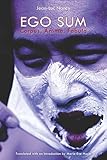Ego Sum : Corpus, Anima, Fabula / Jean-Luc Nancy.
Material type: TextPublisher: New York, NY : Fordham University Press, [2016]Copyright date: ©2016Description: 1 online resource (168 p.)Content type:
TextPublisher: New York, NY : Fordham University Press, [2016]Copyright date: ©2016Description: 1 online resource (168 p.)Content type: - 9780823270620
- 9780823270644
- 110 23
- B1875 .N3613 2016
- online - DeGruyter
- Issued also in print.
| Item type | Current library | Call number | URL | Status | Notes | Barcode | |
|---|---|---|---|---|---|---|---|
 eBook
eBook
|
Biblioteca "Angelicum" Pont. Univ. S.Tommaso d'Aquino Nuvola online | online - DeGruyter (Browse shelf(Opens below)) | Online access | Not for loan (Accesso limitato) | Accesso per gli utenti autorizzati / Access for authorized users | (dgr)9780823270644 |
Frontmatter -- Contents -- Preface to the English Edition -- Translator's Introduction -- Ego Sum: Opening -- Dum Scribo -- Larvatus pro Deo -- Mundus Est Fabula -- Unum Quid -- Notes
restricted access online access with authorization star
http://purl.org/coar/access_right/c_16ec
First published in 1979 but never available in English until now, Ego Sum challenges, through a careful and unprecedented reading of Descartes's writings, the picture of Descartes as the father of modern philosophy: the thinker who founded the edifice of knowledge on the absolute self-certainty of a Subject fully transparent to itself. While other theoretical discourses, such as psychoanalysis, have also attempted to subvert this Subject, Nancy shows how they always inadvertently reconstituted the Subject they were trying to leave behind.Nancy's wager is that, at the moment of modern subjectivity's founding, a foundation that always already included all the possibilities of its own exhaustion, another thought of "the subject" is possible. By paying attention to the mode of presentation of Descartes's subject, to the masks, portraits, feints, and fables thatpopulate his writings, Jean-Luc Nancy shows how Descartes's ego is not the Subject of metaphysics but a mouth that spaces itself out and distinguishes itself.
Issued also in print.
Mode of access: Internet via World Wide Web.
In English.
Description based on online resource; title from PDF title page (publisher's Web site, viewed 02. Mrz 2022)


